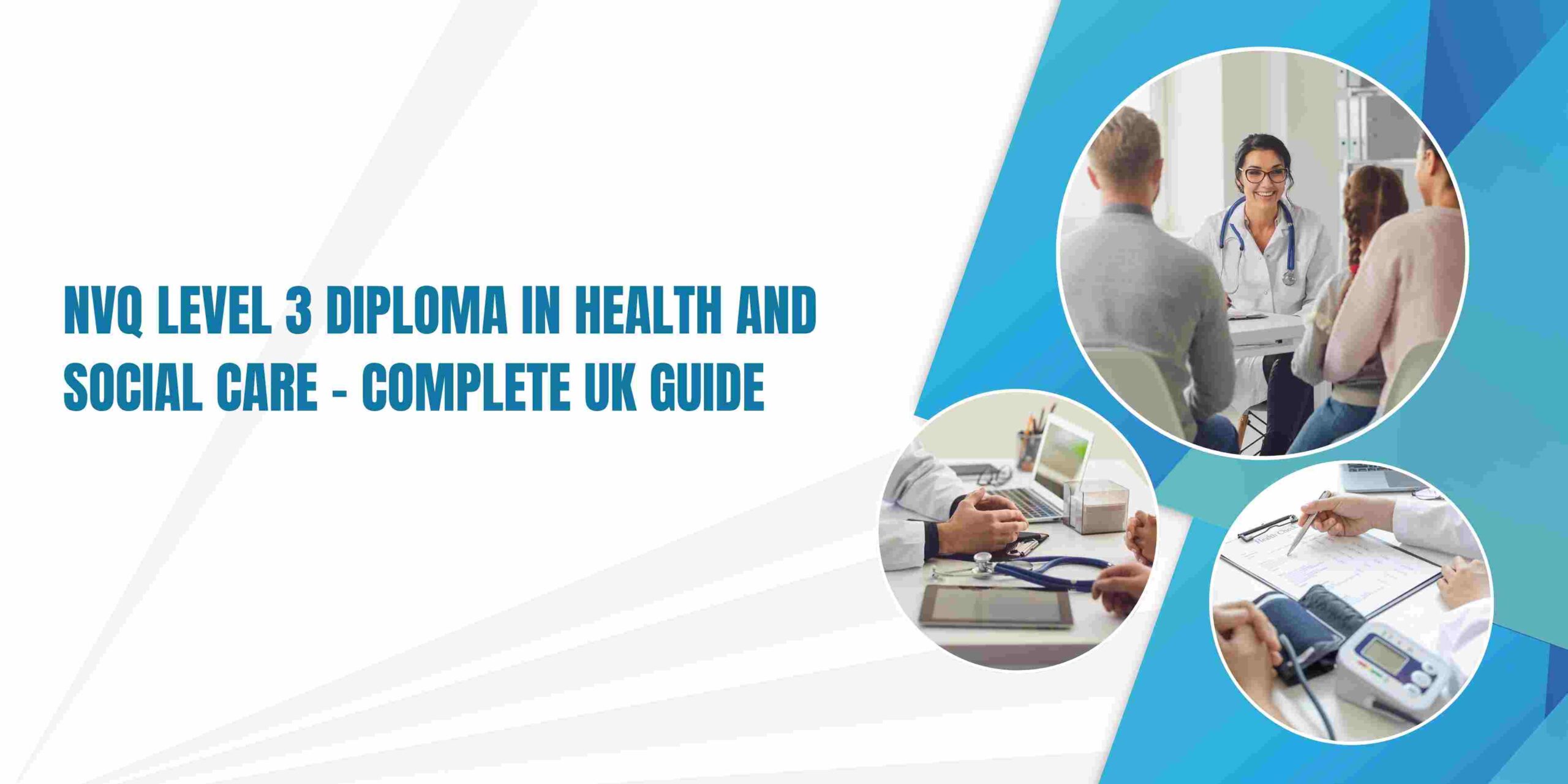Introduction
NVQ Level 3 Diploma in Health and Social Care equips learners with critical knowledge and practical skills. This qualification prepares individuals for career advancement in the adult care sector. UK employers recognise it as a standard for senior care roles. Learners develop understanding through theory and real-world application.
The course benefits people already working in care or those looking to secure senior-level responsibilities. It builds on Level 2 foundation knowledge and introduces complex care scenarios. Assessment focuses on real-time evidence gathered from professional practice.
What Is the NVQ Level 3 Diploma in Health and Social Care?
This diploma confirms competence in delivering health and social care services. It blends practical tasks with reflective learning. Learners complete modules linked to person-centred care, communication, safeguarding, and well-being. Certification demonstrates readiness to work independently or supervise others.
Learners follow national occupational standards. Units focus on real workplace responsibilities. The diploma opens doors to roles with more authority and trust.
Key Topics Covered in the Course
The NVQ Level 3 Diploma in Health and Social Care includes a mix of mandatory and optional units. Each unit develops specific care competencies. Learners can tailor some units to match their work role.
Core units include:
Promote communication in care settings
Promote personal development in care roles
Promote equality and inclusion
Implement duty of care
Support health and safety practices
Understand safeguarding and protection procedures
Promote person-centred values
Handle information in care settings
Optional units often include:
Support individuals with physical or learning disabilities
Promote positive behaviour
Work in end-of-life care
Support individuals with mental health needs
Understand the impact of acquired brain injuries
Promote nutrition and hydration
Provide support to manage pain and discomfort
Each module includes assignments, case studies, and workplace observation.
Who Should Take This Course?
The diploma suits individuals currently working in health or social care. It also helps those looking to move into more senior or supervisory roles.
Suitable candidates include:
Care assistants with at least one year of experience
Senior support workers aiming for promotion
Healthcare workers in domiciliary or residential settings
Volunteers working in community care services
Apprentices in care sectors
Staff needing qualifications for CQC-regulated positions
Applicants must be aged 19 or above. Access to a real working environment is essential.
Entry Requirements
Most providers do not demand formal academic qualifications. However, learners must work in a care role or complete a placement. Access to service users ensures evidence can be collected.
Basic requirements include:
UK residency
Age 19 or older
Active job or placement in a care setting
Good spoken and written English
Ability to use basic computer systems for online study
Providers may also request a DBS check depending on the care setting.
Course Structure and Format
Learners complete the NVQ Level 3 Diploma in Health and Social Care over 9 to 12 months. Some learners finish earlier depending on time commitment and work-based evidence.
Key features include:
Modular learning through an online platform
Tutor and assessor support
Workplace observations
Evidence submission via e-portfolio
Feedback and resubmission for unit completion
No final exam—continuous assessment instead
Students study at their own pace. They complete learning materials while working full- or part-time.
How the Course Is Assessed
The course uses practical assessment based on the learner’s role. No written exams are involved. Assessment is ongoing and based on evidence.
Assessment tools include:
Observations by qualified assessors
Reflective accounts
Supervisor or witness testimonies
Written questions and workbooks
Product evidence (care plans, reports, forms)
Professional discussions
Learning logs
Learners upload evidence to an e-portfolio. Assessors review and provide feedback until units meet criteria.
Benefits of the NVQ Level 3 Diploma
This qualification offers several personal and professional benefits. It confirms the learner’s ability to handle complex care responsibilities.
Main benefits include:
Recognition from employers
Improved salary and job prospects
Stronger understanding of legal and ethical care principles
Skills that meet CQC and care regulator requirements
Entry into advanced apprenticeships
Enhanced confidence in managing care delivery
Many employers require this diploma for team leader or senior support worker roles.
Career Opportunities After Completion
The diploma leads to advancement within care roles. Learners often qualify for more responsibility or higher-level roles.
Possible career paths include:
Senior care assistant
Residential care supervisor
Domiciliary care team leader
Reablement worker
Specialist support worker
Assistant practitioner (with further training)
Completion also allows progression into Level 4 or Level 5 Health and Social Care qualifications.
Pathway to Further Education
The NVQ Level 3 Diploma in Health and Social Care lays the foundation for further qualifications.
Progression options include:
Level 4 Diploma in Adult Care
Level 5 Diploma in Leadership for Health and Social Care
Foundation degrees in healthcare practice
Access to Nursing or Social Work courses
Degree apprenticeships in nursing or management
Learners build on their diploma knowledge and move into leadership or regulated professional roles.
Ideal Daily Routine for Learners
A learner logs into the online platform. They open a new unit on safeguarding. They review the course materials and complete a knowledge quiz. During their shift, they reflect on a situation involving risk management. Later, they write a reflective journal and upload it.
They receive feedback from the assessor. They make small revisions and re-submit. A few days later, they record a discussion about safeguarding with a colleague. The assessor approves the unit.
Certification and Recognition
Successful learners receive a nationally recognised qualification. The NVQ Level 3 Diploma in Health and Social Care is accepted by care providers across the UK. It meets the requirements for many regulated job roles.
Certificates are usually issued digitally. Some providers also offer printed versions.
Support and Resources
Learners receive personalised support throughout the course. Providers assign assessors or tutors to each learner. Regular check-ins and feedback improve understanding.
Support features include:
One-to-one tutor guidance
Assignment templates
Sample responses
Live workshops or webinars
Online discussion forums
Technical help for the learning platform
Resources help learners stay focused and complete tasks efficiently.
Summary
The NVQ Level 3 Diploma in Health and Social Care prepares individuals for confident, competent caregiving. Learners develop advanced skills through online study and real workplace practice. The course enhances job security, promotion potential, and personal growth.
With flexible scheduling and tutor support, the diploma suits full-time workers, career changers, and adult learners. Upon completion, graduates meet the expectations of UK care employers and regulators. The qualification forms a strong foundation for long-term success in health and social care.
Read More:







